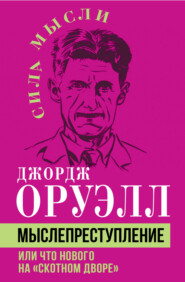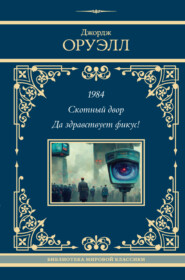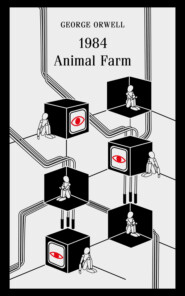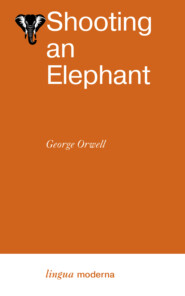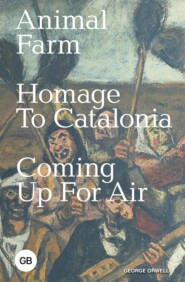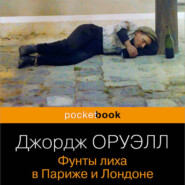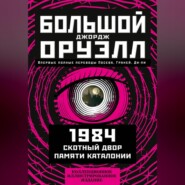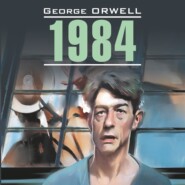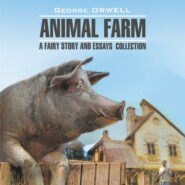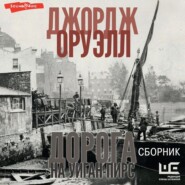По всем вопросам обращайтесь на: info@litportal.ru
(©) 2003-2025.
✖
1984
Настройки чтения
Размер шрифта
Высота строк
Поля
The frightening thing, he reflected for the ten thousandth time as he forced his shoulders painfully backward (with hands on hips, they were gyrating their bodies from the waist, an exercise that was supposed to be good for the back muscles) – the frightening thing was that it might all be true. If the Party could thrust its hand into the past and say of this or that event, it never happened – that, surely, was more terrifying than mere torture and death?
The Party said that Oceania had never been in alliance with Eurasia. He, Winston Smith, knew that Oceania had been in alliance with Eurasia as short a time as four years ago. But where did that knowledge exist? Only in his own consciousness, which in any case must soon be annihilated. And if all others accepted the lie which the Party imposed – if all records told the same tale – then the lie passed into history and became truth.
“Who controls the past,” ran the Party slogan, “controls the future: who controls the present controls the past.”
And yet the past, though of its nature alterable, never had been altered. Whatever was true now was true from everlasting to everlasting. It was quite simple. All that was needed was an unending series of victories over your own memory. “Reality control”, they called it: in Newspeak, “doublethink”.
“Stand easy! ” barked the instructress, a little more genially.
Winston sank his arms to his sides and slowly refilled his lungs with air. His mind slid away into the labyrinthine world of doublethink. To know and not to know, to be conscious of complete truthfulness while telling carefully constructed lies, to hold simultaneously two opinions which cancelled out, knowing them to be contradictory and believing in both of them, to use logic against logic, to repudiate morality while laying claim to it, to believe that democracy was impossible and that the Party was the guardian of democracy, to forget whatever it was necessary to forget, then to draw it back into memory again at the moment when it was needed, and then promptly to forget it again: and above all, to apply the same process to the process itself. That was the ultimate subtlety: consciously to induce unconsciousness, and then, once again, to become unconscious of the act of hypnosis you had just performed. Even to understand the word “doublethink” involved the use of doublethink.
The instructress had called them to attention again.
“And now let’s see which of us can touch our toes!” she said enthusiastically. “Right over from the hips, please, comrades. One, two! One, two!..”
Winston loathed this exercise, which sent shooting pains all the way from his heels to his buttocks and often ended by bringing on another coughing fit. The half pleasant quality went out of his meditations. The past, he reflected, had not merely been altered, it had been actually destroyed. For how could you establish even the most obvious fact when there existed no record outside your own memory? He tried to remember in what year he had first heard mention of Big Brother. He thought it must have been at some time in the sixties, but it was impossible to be certain. In the Party histories, of course, Big Brother figured as the leader and guardian of the Revolution since its very earliest days. His exploits had been gradually pushed backwards in time until already they extended into the fabulous world of the forties and the thirties, when the capitalists in their strange cylindrical hats still rode through the streets of London in great gleaming motor cars or horse carriages with glass sides. There was no knowing how much of this legend was true and how much invented. Winston could not even remember at what date the Party itself had come into existence. He did not believe he had ever heard the word Ingsoc before 1960, but it was possible that in its Oldspeak form – “English Socialism”, that is to say – it had been current earlier. Everything melted into mist. Sometimes, indeed, you could put your finger on a definite lie. It was not true, for example, as was claimed in the Party history books, that the Party had invented aeroplanes. He remembered aeroplanes since his earliest childhood. But you could prove nothing. There was never any evidence. Just once in his whole life he had held in his hands unmistakable documentary proof of the falsification of an historical fact. And on that occasion —
The Party said that Oceania had never been in alliance with Eurasia. He, Winston Smith, knew that Oceania had been in alliance with Eurasia as short a time as four years ago. But where did that knowledge exist? Only in his own consciousness, which in any case must soon be annihilated. And if all others accepted the lie which the Party imposed – if all records told the same tale – then the lie passed into history and became truth.
“Who controls the past,” ran the Party slogan, “controls the future: who controls the present controls the past.”
And yet the past, though of its nature alterable, never had been altered. Whatever was true now was true from everlasting to everlasting. It was quite simple. All that was needed was an unending series of victories over your own memory. “Reality control”, they called it: in Newspeak, “doublethink”.
“Stand easy! ” barked the instructress, a little more genially.
Winston sank his arms to his sides and slowly refilled his lungs with air. His mind slid away into the labyrinthine world of doublethink. To know and not to know, to be conscious of complete truthfulness while telling carefully constructed lies, to hold simultaneously two opinions which cancelled out, knowing them to be contradictory and believing in both of them, to use logic against logic, to repudiate morality while laying claim to it, to believe that democracy was impossible and that the Party was the guardian of democracy, to forget whatever it was necessary to forget, then to draw it back into memory again at the moment when it was needed, and then promptly to forget it again: and above all, to apply the same process to the process itself. That was the ultimate subtlety: consciously to induce unconsciousness, and then, once again, to become unconscious of the act of hypnosis you had just performed. Even to understand the word “doublethink” involved the use of doublethink.
The instructress had called them to attention again.
“And now let’s see which of us can touch our toes!” she said enthusiastically. “Right over from the hips, please, comrades. One, two! One, two!..”
Winston loathed this exercise, which sent shooting pains all the way from his heels to his buttocks and often ended by bringing on another coughing fit. The half pleasant quality went out of his meditations. The past, he reflected, had not merely been altered, it had been actually destroyed. For how could you establish even the most obvious fact when there existed no record outside your own memory? He tried to remember in what year he had first heard mention of Big Brother. He thought it must have been at some time in the sixties, but it was impossible to be certain. In the Party histories, of course, Big Brother figured as the leader and guardian of the Revolution since its very earliest days. His exploits had been gradually pushed backwards in time until already they extended into the fabulous world of the forties and the thirties, when the capitalists in their strange cylindrical hats still rode through the streets of London in great gleaming motor cars or horse carriages with glass sides. There was no knowing how much of this legend was true and how much invented. Winston could not even remember at what date the Party itself had come into existence. He did not believe he had ever heard the word Ingsoc before 1960, but it was possible that in its Oldspeak form – “English Socialism”, that is to say – it had been current earlier. Everything melted into mist. Sometimes, indeed, you could put your finger on a definite lie. It was not true, for example, as was claimed in the Party history books, that the Party had invented aeroplanes. He remembered aeroplanes since his earliest childhood. But you could prove nothing. There was never any evidence. Just once in his whole life he had held in his hands unmistakable documentary proof of the falsification of an historical fact. And on that occasion —
Вы ознакомились с фрагментом книги.
Приобретайте полный текст книги у нашего партнера:
Приобретайте полный текст книги у нашего партнера:






